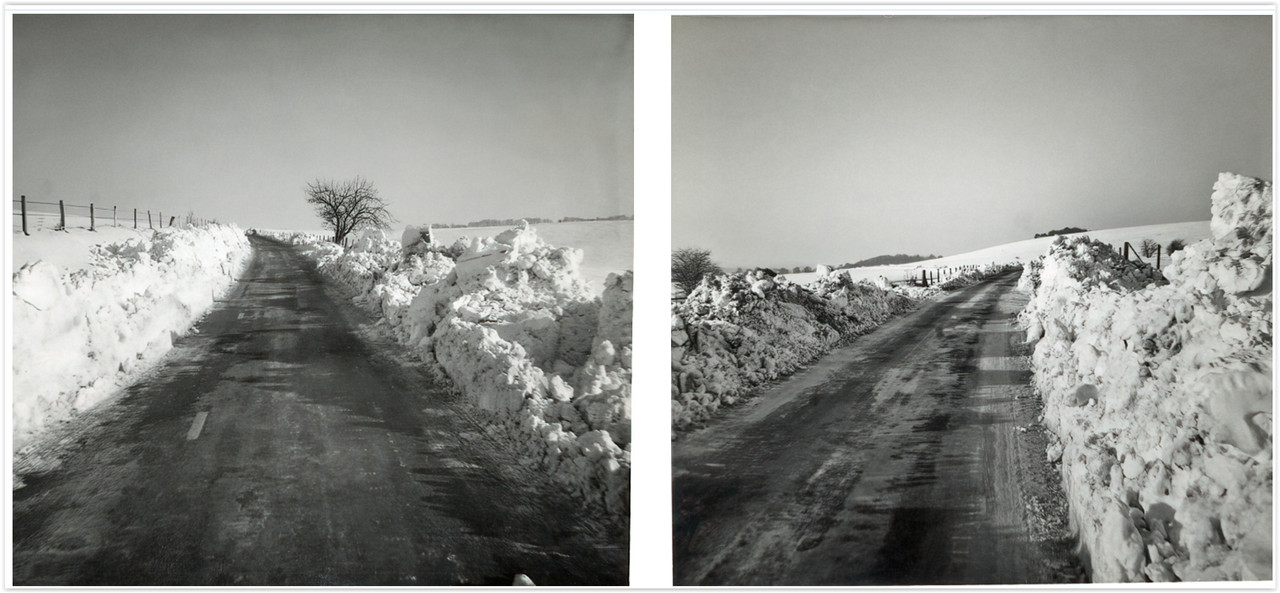| Re: OTD - 23rd January (1947) - Start of the big freeze Posted by Chris from Nailsea at 20:58, 25th January 2026 |     |
I was a 9 year old milk monitor at my primary school, and well remember carting in 24 third of a pint glass bottles of milk with the silver caps 3 or 4 inches above where they should be as the cream had frozen.
I have similar memories to those, chuffed! Similar role, similar bottles - Plymouth, 1967 or so.

| Re: OTD - 23rd January (1947) - Start of the big freeze Posted by chuffed at 20:51, 25th January 2026 |     |
I was a 9 year old milk monitor at my primary school, and well remember carting in 24 third of a pint glasses bottle of milk with the silver caps 3 or 4 inches above where they should be as the cream had frozen. Put next to the coke stove to thaw out by 11am ready for Singing Together with William Appleby. Fast forward 20 years I was teaching similarly aged children in '82....no milk but Singing Together and a cream coloured coke stove lived on !
| Re: OTD - 23rd January (1947) - Start of the big freeze Posted by Clan Line at 14:00, 24th January 2026 |     |
Winter 62/63. B390 between Knook Camp and Chitterne - after it had been "cleared". That bush is still there !!!

| Re: OTD - 23rd January (1947) - Start of the big freeze Posted by Chris from Nailsea at 22:06, 23rd January 2026 |     |
Thank you to all members of the Coffee Shop forum who have added their own personal memories to this topic here.
If those memories are not recorded somewhere, they could be lost forever.
Thanks again, CfN.

| Re: OTD - 23rd January (1947) - Start of the big freeze Posted by Oxonhutch at 21:41, 23rd January 2026 |     |
Another alternative of house coal, if this was in short supply, was "gas works coke" which was alleged to be almost fire-proof.
It actually burnt well in a closed stove or boiler with a good draught, but was less satisfactory on an open fire.
Gas works coke was often made available for free to "the needy" or even to anyone if collected from the local gas works.
A number of lives were lost in accidents resulting from attempting to burn gas works coke in open fires.
It actually burnt well in a closed stove or boiler with a good draught, but was less satisfactory on an open fire.
Gas works coke was often made available for free to "the needy" or even to anyone if collected from the local gas works.
A number of lives were lost in accidents resulting from attempting to burn gas works coke in open fires.
My dad told me that every Saturday, he and his younger brother would push an old pram down to the town gas works to be filled with coke.
My mum who was 9 in 1947 says that she remembered the seashore south of Blackpool freezing.
| Re: OTD - 23rd January (1947) - Start of the big freeze Posted by broadgage at 21:24, 23rd January 2026 |     |
For 26th December 1962, adding OTD for the big freeze of 1962/3 which is within my living memory
From Wikipedia
I remember my mother's school friend Hilda Rowley arriving back from India - via a ship and staying with us in Orpington before she headed back home up north. We were cold anyway and had a problem sourcing any more coal to keep the house warmer. The only thing we could obtain was some stuff called "Glowco" and we came to understand why - it glowed rather than burned and we had some of the dreadfully near-useless stuff clogging our bunkers of what felt like years!
OTD log - replaced:1226 2019 ~ Every HST Livery? https://transportdesigned.com/pictures-every-single-hst-livery-ever/ hstyatt
From Wikipedia
Throughout the Christmas period, the Scandinavian high collapsed, but a new high formed near Iceland, bringing northerly winds. Significant snowfall occurred on the 26 and 27 December as the air mass moved south, the snow arriving in Shropshire around lunchtime on the 26th and parts of Southern England late that same day.
By the end of the month, there were snow drifts 8 feet (2.4 m) deep in Kent and 15 feet (4.6 m) deep in the west.
By the end of the month, there were snow drifts 8 feet (2.4 m) deep in Kent and 15 feet (4.6 m) deep in the west.
I remember my mother's school friend Hilda Rowley arriving back from India - via a ship and staying with us in Orpington before she headed back home up north. We were cold anyway and had a problem sourcing any more coal to keep the house warmer. The only thing we could obtain was some stuff called "Glowco" and we came to understand why - it glowed rather than burned and we had some of the dreadfully near-useless stuff clogging our bunkers of what felt like years!
OTD log - replaced:1226 2019 ~ Every HST Livery? https://transportdesigned.com/pictures-every-single-hst-livery-ever/ hstyatt
I remember a near useless patent fuel, popularly known as "mouldy glow" or even as "no glow", possibly the same stuff ?
More recently, the Late Fred Dibna put me off coal based smokeless fuels, by calling them "Gods good coal, from which all the goodness has been taken out"
Another alternative to house coal, if this was in short supply, was "gas works coke" which was alleged to be almost fire-proof.
It actually burnt well in a closed stove or boiler with a good draught, but was less satisfactory on an open fire.
Gas works coke was often made available for free to "the needy" or even to anyone if collected from the local gas works.
A number of lives were lost in accidents resulting from attempting to burn gas works coke in open fires.
| Re: OTD - 23rd January (1947) - Start of the big freeze Posted by Chris from Nailsea at 13:56, 26th December 2025 |     |
For 26th December 1962, adding OTD for the big freeze of 1962/3 which is within my living memory ...
Probably second in my own earliest memories (the first is the birth of my sister, when I was less than 3 years old) is a visit to my maternal grandparents' house in Plymouth, just after Christmas 1962. I would then have been aged just under 4.
Their house was on a hillside, with a raised path from the front to the back gardens - no safety railings, those were the days before 'elf n safety' was invented. As a confident toddler, I remember striding down that snowy path, stepping slightly too far to the right and dropping vertically down into a huge snowdrift - well over my head height. I remember my father and grandfather laughing as they reached down into the snow to lift me back up.
CfN.

| Re: OTD - 23rd January (1947) - Start of the big freeze Posted by CyclingSid at 11:43, 26th December 2025 |     |
I was living on Hayling Island, and we had a sunken road between farmers fields. I woke up to what was the top of a double decker Southdown bus visible between between the fields. Southdown policy was that crews were not allowed to leave an in-service bus. Fortunately the driver and conductor lived locally and their wives carried tea cans (remember the time before Thermos flaks were widely available) to them across the fields. I believe it was mid morning before the company said they could leave the bus.
The bigger risk nowadays is more likely to be a Q-Day, when a cyber attack takes out the majority of modern infrastructure in the country.
| Re: OTD - 23rd January (1947) - Start of the big freeze Posted by grahame at 07:19, 26th December 2025 |     |
For 26th December 1962, adding OTD for the big freeze of 1962/3 which is within my living memory
From Wikipedia
Throughout the Christmas period, the Scandinavian high collapsed, but a new high formed near Iceland, bringing northerly winds. Significant snowfall occurred on the 26 and 27 December as the air mass moved south, the snow arriving in Shropshire around lunchtime on the 26th and parts of Southern England late that same day.
By the end of the month, there were snow drifts 8 feet (2.4 m) deep in Kent and 15 feet (4.6 m) deep in the west.
By the end of the month, there were snow drifts 8 feet (2.4 m) deep in Kent and 15 feet (4.6 m) deep in the west.
I remember my mother's school friend Hilda Rowley arriving back from India - via a ship and staying with us in Orpington before she headed back home up north. We were cold anyway and had a problem sourcing any more coal to keep the house warmer. The only thing we could obtain was some stuff called "Glowco" and we came to understand why - it glowed rather than burned and we had some of the dreadfully near-useless stuff clogging our bunkers of what felt like years!
OTD log - replaced:1226 2019 ~ Every HST Livery? https://transportdesigned.com/pictures-every-single-hst-livery-ever/ hstyatt
| Re: OTD - 23rd January (1947) - Start of the big freeze Posted by stuving at 10:55, 24th January 2022 |     |
The more modest levels of "power cut" such as 5% do indeed almost certainly refer to voltage reductions.
Not certain about 15% though as that is an improbably large voltage reduction.
Not certain about 15% though as that is an improbably large voltage reduction.
Quite so - that's why I referred to "voltage reductions and agreed turning off of big industrial loads". The Echo made the same point later in its piece, describing events in various surrounding areas, for example:
"There was no actual cut-off in the supply of electricity in the Birkenhead area to-day, and the Echo is officially informed that the necessary saving was effected by lowering the voltage and by the co-operation of industries."
In addition, I think you have taken those figures of 5 per cent etc. as reductions in voltage - which I did initially too. But when read carefully, it becomes clear that they are literal power reductions. Of course disconnecting a big single load is easier to include in the count of savings that way.
| Re: OTD - 23rd January (1947) - Start of the big freeze Posted by broadgage at 05:00, 24th January 2022 |     |
The more modest levels of "power cut" such as 5% do indeed almost certainly refer to voltage reductions.
Not certain about 15% though as that is an improbably large voltage reduction.
Voltages were not standardised in that era and varied from one district to another, there was still a fair bit of DC.
A 15% reduction would prevent proper operation of many appliances, especially under worst case conditions such as an already rather low voltage before the reduction.
Worst case might be a nominal 200 volt supply that was already down to an actual 190 volts at the intake, and down to 185 volts at the point of use. A further 15% reduction would result in only about 160 volts at the point of use.
A 200 volt lamp run at 160 volts will give a truly miserable light and tempt most consumers to use extra lamps or higher wattage bulbs, thereby increasing consumption.
A 200 volt heater run at 160 volts will be significantly less effective and prompt use of an extra heater if available.
Electric motors would be at risk of stalling and perhaps burning out.
Fluorescent lamps might fail to start.
| Re: OTD - 23rd January (1947) - Start of the big freeze Posted by stuving at 14:13, 23rd January 2022 |     |
I'm not sure there is a single date when the severe weather of 1947 started, even in a single place, let alone the whole country. It was already a cold winter with disruption to rail services before Christmas. So when did "bad" cross the line to become "severe", or does it need to be "very severe"? And who's judging?
For example, on 7th January the Liverpool Echo was reporting nationwide power cuts after three days of bad weather:
"Starting with a 5 per cent. reduction at 8 a.m., the cuts were increased in stages to 15 per cent., but after a short time 1.5 per cent. cut continued until noon. Liverpool was more fortunate than some districts where a complete "cut-out" was made, and many breakfasts were cold."
Note the linguistic point that at this date "power cut" means a power reduction, achieved by voltage reductions and agreed turning off of big industrial loads. "Complete cut-out" or "black-out" were used for what we would call a power cut. Plus of course the electricity supply was still recovering from the war, so power cuts (or black-outs) were still quite common in a "normal" winter.
The later flooding has a much clearer start date, at least for a given place - 14th March in Reading. Talking of which (and climate change) I was at one of the Environment Agency's meet-the-people events about the Reading/Caversham flood barrier and came across this guy who was convinced there would never be another Thames flood. His "reasoning" was that we would not get much snow, due to warming, and the last big flood was due (only in part, actually) to snow melt. I got drawn into trying to put him right, which was of course pointless, and just led to him thinking I was EA staff (they were under strict instructions to avoid anything resembling an argument, even at the cost of not putting the arguments across).
One point I was trying to make was that the biggest known flood (based on flow measurements) was in 1894, and was in early November. No snow involved - just three days of heavy rain in the Thames catchment - and with negligible benefit of global warming, too. But there is still a memory of 1947 (partly inside living people), and none of 1894 (and surprisingly few photos).
| Re: OTD - 23rd January (1947) - Start of the big freeze Posted by didcotdean at 11:05, 23rd January 2022 |     |
Since 1963, the Central England Temperature series has recorded a mean negative value for a month only three times: January 1979, February 1986, and December 2010.
My grandad was a Midland Red bus driver in 1948 and he used to tell stories of how he helped reach villages that had been cut off for 3-4 weeks, with a snow plough fitted on the front of the bus.
| Re: OTD - 23rd January (1947) - Start of the big freeze Posted by IndustryInsider at 08:33, 23rd January 2022 |     |
"We don't have winters like that any more ..."
We certainly don't seem to, though 1963, 1981 and (to an extent) 2010 were no too far away. As every year passes the chances reduce, though it's still not impossible. With twelve years since any significant falls, you can bet the railways will grind to a halt in the south when the next one does arrive.
| Re: OTD - 23rd January (1947) - Start of the big freeze Posted by broadgage at 04:19, 23rd January 2022 |     |
The shortage of electricity was slightly alleviated by the use of moored diesel electric submarines to supply electricity to ports and coastal towns. Only in general applicable to places that used DC supply.
The submarine crews hated this as the considerable air flow needed by the engines resulted in a freezing cold draught throughout the vessel, for days on end.
Known as operation blackcurrant.
| OTD - 23rd January (1947) - Start of the big freeze Posted by grahame at 21:29, 22nd January 2022 |     |
"We don't have winters like that any more ..."
From https://en.wikipedia.org/wiki/Winter_of_1946-47_in_the_United_Kingdom
The winter of 1946–1947 was a harsh European winter noted for its adverse effects in the United Kingdom. It caused severe hardships in economic terms and living conditions in a country still recovering from the Second World War. There were massive disruptions of energy supply for homes, offices and factories. Animal herds froze or starved to death. People suffered from the persistent cold, and many businesses shut down temporarily. When warm weather returned, the ice thawed and flooding was severe in most low-lying areas.
Beginning on 23 January 1947, the UK experienced several cold spells that brought large drifts of snow to the country, blocking roads and railways, which caused problems transporting coal to the electric power stations. Many had to shut down, forcing severe restrictions to cut power consumption, including restricting domestic electricity to nineteen hours per day and cutting some industrial supplies completely. In addition, radio broadcasts were limited, television services were suspended, some magazines were ordered to stop publishing, and newspapers were reduced in size. These measures, on top of the low temperatures, badly affected public morale and the Minister of Fuel and Power, Emanuel Shinwell, became a scapegoat; he received death threats and had to be placed under police guard. Towards the end of February, there were also fears of a food shortage as supplies were cut off and vegetables were frozen into the ground.
Beginning on 23 January 1947, the UK experienced several cold spells that brought large drifts of snow to the country, blocking roads and railways, which caused problems transporting coal to the electric power stations. Many had to shut down, forcing severe restrictions to cut power consumption, including restricting domestic electricity to nineteen hours per day and cutting some industrial supplies completely. In addition, radio broadcasts were limited, television services were suspended, some magazines were ordered to stop publishing, and newspapers were reduced in size. These measures, on top of the low temperatures, badly affected public morale and the Minister of Fuel and Power, Emanuel Shinwell, became a scapegoat; he received death threats and had to be placed under police guard. Towards the end of February, there were also fears of a food shortage as supplies were cut off and vegetables were frozen into the ground.
See also
https://blog.metoffice.gov.uk/2017/01/26/winter-1947-brought-a-freeze-to-post-war-britain/
https://www.metoffice.gov.uk/weather/learn-about/weather/case-studies/severe-winters










